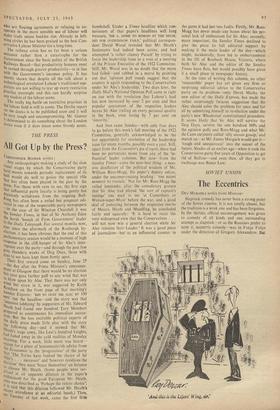THE PRESS
All Got Up by the Press?
CHRISTOPHER BOOKER writes : Their first reward came on Sunday, June 27 --the day after the Prime Minister's announce- ment at Glasgow that there would be no election this Year gave further puff to any wind that was uo. blow upon Sir Alec. That there was not only Wind but straw in it, was suggested by Keith ienabaW on the front page of that morning's s iticlaY Express: 'airs TO OUST SIR ALEC BY 100 PS' ran the headline—and the story was that _intensive lobbying' by supporters of Mr. Edward Heath had found one hundred 'Vary Members Prepared to countenance his immediate succes- ,s.,10n..But the less excitable political experts of ;le daily press made little play with the story ;_.(e following day—and it seemed that Mr.
had stage army, like. Lear's hundred knights, "ad faded away in the cold realities of Monday cn,lorning. For a week, little more was heard__ tLxeePt for a piece of housemasterish advice from that to the 'progressives' of the party AT.1 'The Tories have funked the choice of Sir
tinde's successor' and 'however invidious the
eelsion' they must 'brace themselves' on balance to choose Mr. Heath. (Some people were sur- prised .at an apparent dilution in the paper's enthusiasm for the good European Mr. Heath, Who was described as 'Perhaps the riskier choice'; it Is said that this dilution followed Mr. Heath's recent cent attendance at an editorial lunch.) Then, en Tuesday of last week, came the first little bombshell. Under a Times headline which con- noisseurs of that paper's headlines will long treasure, 'SIR A. HOME TO REMAIN AT THE HELM; BID FOR OVERTHROW FAILS,' political correspon- dent David Wood revealed that Mr. Heath's lieutenants had indeed been active, and had attempted 'a rather clumsy Putsch' by trying to force the leadership issue to a vote it a meeting of the Private Executive of the 1922 Committee. Still, Mr. Wood was in no doubt that the move had failed—and rubbed in a moral by pointing out that 'opinion poll trends suggest that the country is again responding to the Conservatives under Sir Alec's leadership.' Two days later, the Daily Mail's National Opinion Poll came in right on cue with the revelation that Labour's lead has now increased by over 2 per cent and that popular assessment of the respective leaders leaves Sir Alec trailing on every personal quality in the book, even losing by 7 per cent on 'sincerity.'
And then came Sunday—with only four days to go before this week's full meeting of the 1922 Committee, generally acknowledged to be the last opportunity for resolution of the leadership issue for many months, possibly even a year. Still, apart from the Economist's fen d'esprit, there had been no portentous move from any of the 'in- fluential' leader columns. But now—from the Sunday Times—came the next-best thing: a mas- sive distillation of the political wisdom of Mr. William Rees-Mogg, the paper's deputy editor, under the uncompromising heading: 'THE RIGHT MOMENT TO CHANGE.' Not for Mr. Rees-Mogg the veiled innuendo; after the consolatory gesture that Sir Alec had played 'the sort of captain's innings' one used to see 'at Canterbury or Weston-super-Mare' before the war, and a good deal of jockeying between the respective merits of Messrs. Heath and Maudling, he concluded fairly and squarely : 'It is hard to resist the very widespread view that the Conservatives . . . will not now win a general election while Sir Alec remains their. Leader.' It was a good piece of journalism—but as an influential counter in
'Anti this is the Lifers' Wing, sir.'
the game it had just two faults. Firstly, Mr. Rees- Mogg has never made any bones about his per- sonal lack of enthusiasm for Sir Alec; secondly, more important, the Sunday Times declined to give the piece its full editorial support by making it the main leader of the day—which might, incidentally, have led to embarrassment in the lift of Roebuck House, Victoria, where both Sir Alec and the editor of the Sunday Times have flats, but would possibly have given it a small place in newspaper history.
At the time of writing this column, no other 'responsible' paper has yet given any firm or surprising editorial advice to the Conservative party on its problem—only Derek Marks, the new editor of the Daily Express, has made the rather surprisingly fatuous suggestion that Sir Alec should solve the problem for once and for all by submitting himself to re-election under the party's new 'Rhodesian' constitutional procedure. It seems likely that Sir Alec will survive the Dog Days, survive the one hundred MPs and the opinion polls and Rees-Mogg and what Mr. du Cann curiously called 'silly season gossip,' and march on—as Mr. James Margach would put it— 'tough and unequivocal' into the sunset of the future. Shades of an earlier age—when it took the Conservative party five years of Opposition to get rid of Balfour—and even then, all they got in exchange was Bonar Law.














































 Previous page
Previous page